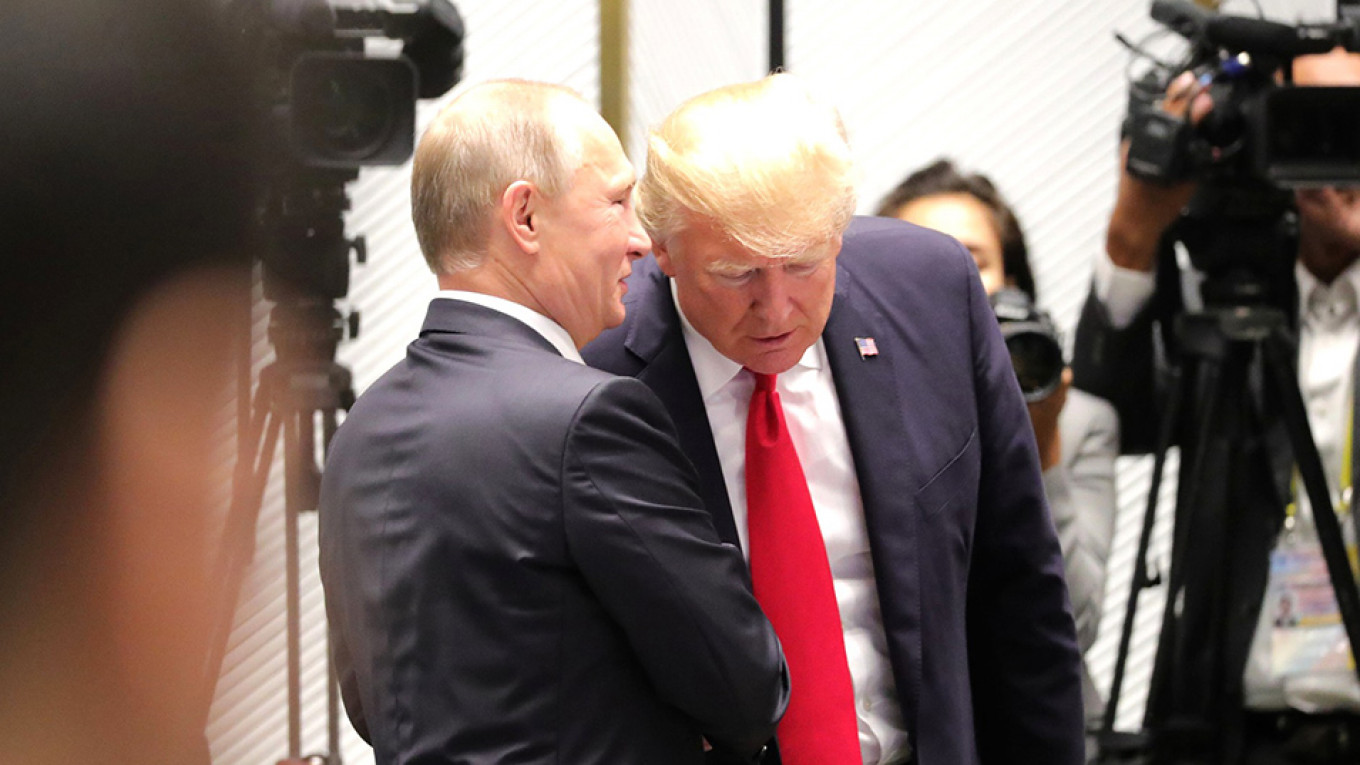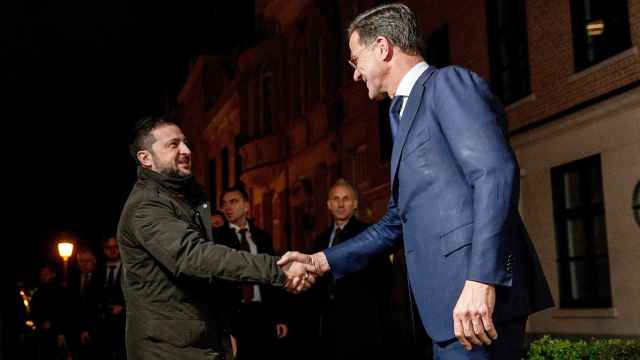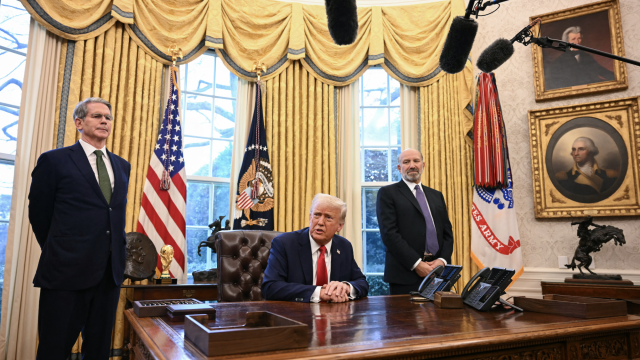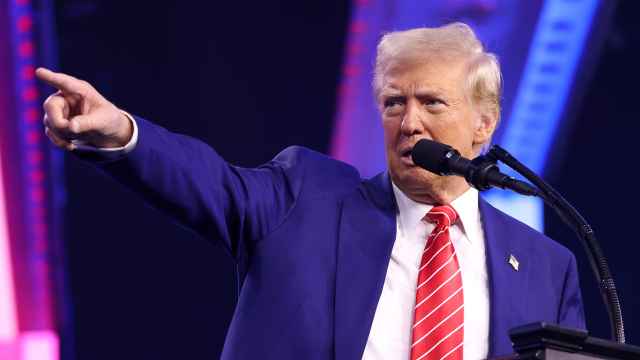Leading Democrats have settled on a familiar thread to connect the two scandals currently engulfing the Trump administration: Russia. As House Speaker Nancy Pelosi asked President Donald Trump last week: Why do “all roads lead to Vladimir Putin”?
Pelosi was referring to president’s chaotic and abrupt decision to pull U.S. forces from the Syrian-Turkish border. But the specter of Russia hangs over the Ukraine scandal, too. Senior White House aides believe that Trump’s conversations with the Russian president and Hungarian Prime Minister Viktor Orban helped to sour his view of Ukraine before his infamous call with that country’s president last summer.
Russia’s sway over Trump is an old theme for Democrats, going back to Hillary Clinton’s 2016 accusation that Trump was Putin’s “puppet.” So it’s not surprising that officials from former President Barack Obama’s administration are connecting Russia to the Syria and Ukraine scandals. As former CIA director John Brennan told MSNBC last week, Putin favored Trump in 2016 so “Russia would be able to have its way in Ukraine and Syria.”
If the point of the impeachment inquiry is to stoke the outrage of the #Resistance, then there’s no harm in linking Russia to Syria and Ukraine. But if the investigation is meant to convince the wider public and moderate Republicans of Trump’s corruption, then the Russia argument is a loser.
Start with an obvious point. The facts of the Ukraine scandal do not support a central claim of the Russia narrative. If Trump was Putin’s “puppet,” then the U.S. president would never have sold Ukraine anti-tank missiles in the first place. Nor would he have provided lethal military assistance to Ukraine, which his predecessor had refused.
Even assuming that this lethal aid was a sop to Congress for the sake of appearances, why would the quo to such a quid be an investigation of former Vice President Joe Biden and his son? What does Putin care about Burisma? No, a more likely quo would have been a demand that Ukraine’s new president begin negotiations to accept Russia’s annexation of Crimea. To date, there is no evidence U.S. policy has changed in this regard.
With Syria, Pelosi and other Democrats have half a point. Trump’s betrayal of the Kurds who helped defeat Islamic State does benefit Russia. At the same time, there is no evidence that Trump cut the cord so abruptly because of Putin’s influence. It’s also worth remembering that U.S. forces in Syria in 2018 repelled an attack that included Russian mercenaries, leading to heavy Russian casualties.
Furthermore, former Obama administration officials are in no position to criticize Trump’s Syria policy for advancing Russian interests. Their policy did the same thing. The Obama administration failed to prevent Russia from establishing military bases in Syria in 2015, giving Putin’s air force effective control of most of the country’s air space. Indeed, then-Secretary of State John Kerry tried throughout 2016 to negotiate a Syria cease-fire with his Russian counterpart even as Russia was bombing the U.S.-supported Free Syrian Army.
Finally, the argument that Trump’s scandals are somehow the fruit of Russian espionage once again invites intelligence and law-enforcement agencies to play an unhealthy role in U.S. politics. In determining the president’s fitness for office, it effectively asks that the judgment of voters and legislators be replaced with that of spies and lawmen. It requires citizens to trust a bureaucracy that has selectively disclosed state secrets. And it makes Congress a partner with agencies for which it should be providing oversight.
Americans have already seen what this looks like. During the first two and a half years of the Trump presidency, most of official Washington was in a state of suspended speculation about the extent of Putin’s influence over Trump. At the end of the ordeal, Special Counsel Robert Mueller did not find evidence of a conspiracy between the Trump campaign and Russia during the 2016 election.
Yes, he did present evidence of a president trying and failing to obstruct that investigation. He also found a campaign that was cravenly willing to use emails stolen and publicized by Russia to press its political advantage. But the conspiracy spelled out in the opposition research dossier that so intrigued the FBI in 2016 (and has been an obsession of the resistance ever since) did not turn out to be true.
There is a far simpler explanation for Trump’s decision-making on Ukraine and Syria: The president is a wrecking ball. He has no appreciation of America’s alliances. He justifies his own abuse of power because he is convinced that his political adversaries have done worse. If he wins re-election, he will abuse his power even more. That is the case Democrats should be making — and it should be enough to persuade a majority of Americans that Trump is not fit for the office he holds.
This article first appeared in Bloomberg
A Message from The Moscow Times:
Dear readers,
We are facing unprecedented challenges. Russia's Prosecutor General's Office has designated The Moscow Times as an "undesirable" organization, criminalizing our work and putting our staff at risk of prosecution. This follows our earlier unjust labeling as a "foreign agent."
These actions are direct attempts to silence independent journalism in Russia. The authorities claim our work "discredits the decisions of the Russian leadership." We see things differently: we strive to provide accurate, unbiased reporting on Russia.
We, the journalists of The Moscow Times, refuse to be silenced. But to continue our work, we need your help.
Your support, no matter how small, makes a world of difference. If you can, please support us monthly starting from just $2. It's quick to set up, and every contribution makes a significant impact.
By supporting The Moscow Times, you're defending open, independent journalism in the face of repression. Thank you for standing with us.
Remind me later.








